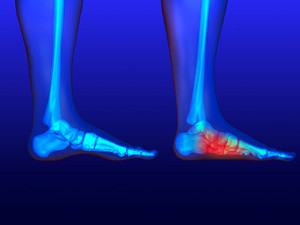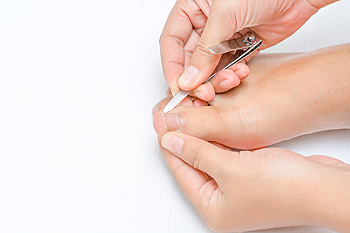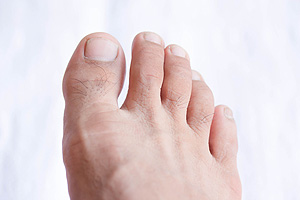
Freehold (732) 294-9393

Freehold (732) 294-9393
 Flat feet is a condition that is caused when the arches have completely or partially collapsed. The feet are considered to be flexible, consisting of 26 bones, numerous muscles and tendons. These all work together, helping us to perform everyday functions such as walking, running, and balancing. The arches allow the foot to open and close, absorbing the physical shock of landing that occurs while walking. Additionally, they’re also needed to balance the body’s weight as we move through the day. There are many potential causes of flat feet, including damage to the bones in the foot, inherited traits, arthritis, or conditions such as cerebral palsy. Symptoms may include pain around the foot or ankle, stiffness in the foot, or a feeling of imbalance. Diagnosis typically consists of an MRI scan of the foot or possibly testing the tendons. A consultation with a podiatrist is recommended for the best choice of treatment.
Flat feet is a condition that is caused when the arches have completely or partially collapsed. The feet are considered to be flexible, consisting of 26 bones, numerous muscles and tendons. These all work together, helping us to perform everyday functions such as walking, running, and balancing. The arches allow the foot to open and close, absorbing the physical shock of landing that occurs while walking. Additionally, they’re also needed to balance the body’s weight as we move through the day. There are many potential causes of flat feet, including damage to the bones in the foot, inherited traits, arthritis, or conditions such as cerebral palsy. Symptoms may include pain around the foot or ankle, stiffness in the foot, or a feeling of imbalance. Diagnosis typically consists of an MRI scan of the foot or possibly testing the tendons. A consultation with a podiatrist is recommended for the best choice of treatment.
Flatfoot is a condition many people suffer from. If you have flat feet, contact Dr. Henry Miller from New Jersey. Our doctor will treat your foot and ankle needs.
What Are Flat Feet?
Flatfoot is a condition in which the arch of the foot is depressed and the sole of the foot is almost completely in contact with the ground. About 20-30% of the population generally has flat feet because their arches never formed during growth.
Conditions & Problems:
Having flat feet makes it difficult to run or walk because of the stress placed on the ankles.
Alignment – The general alignment of your legs can be disrupted, because the ankles move inward which can cause major discomfort.
Knees – If you have complications with your knees, flat feet can be a contributor to arthritis in that area.
Symptoms
Treatment
If you are experiencing pain and stress on the foot you may weaken the posterior tibial tendon, which runs around the inside of the ankle.
If you have any questions please feel free to contact our office located in Freehold, NJ . We offer the newest diagnostic and treatment technologies for all your foot and ankle needs.
 Ingrown toenails are nails that have grown into the surrounding skin due to a variety of reasons. Some of these include cutting the nails too short, wearing tight-fitting shoes, and damaging the toe through trauma. In most cases, an ingrown toenail is not too serious and can be treated at home. Toe protectors, antibiotic ointments, and washing your feet can all help speed up recovery and stave off infection. To help prevent ingrown toenails, be sure to wear shoes that are properly fitted and provide enough room for your toes. When you clip your toenails, cut them straight across to help prevent them from growing into the skin. Seeing a podiatrist is highly recommended, as a podiatrist can provide better treatment options .If you are diabetic, it is strongly recommended that you see a podiatrist as the risk of infection is greatly heightened.
Ingrown toenails are nails that have grown into the surrounding skin due to a variety of reasons. Some of these include cutting the nails too short, wearing tight-fitting shoes, and damaging the toe through trauma. In most cases, an ingrown toenail is not too serious and can be treated at home. Toe protectors, antibiotic ointments, and washing your feet can all help speed up recovery and stave off infection. To help prevent ingrown toenails, be sure to wear shoes that are properly fitted and provide enough room for your toes. When you clip your toenails, cut them straight across to help prevent them from growing into the skin. Seeing a podiatrist is highly recommended, as a podiatrist can provide better treatment options .If you are diabetic, it is strongly recommended that you see a podiatrist as the risk of infection is greatly heightened.
Ingrown toenails can become painful if they are not treated properly. For more information about ingrown toenails, contact Dr. Henry Miller of New Jersey. Our doctor can provide the care you need to keep you pain-free and on your feet.
Ingrown Toenails
Ingrown toenails occur when a toenail grows sideways into the bed of the nail, causing pain, swelling, and possibly infection.
Causes
Prevention
Because ingrown toenails are not something found outside of shoe-wearing cultures, going barefoot as often as possible will decrease the likeliness of developing ingrown toenails. Wearing proper fitting shoes and using proper cutting techniques will also help decrease your risk of developing ingrown toenails.
Treatment
Ingrown toenails are a very treatable foot condition. In minor cases, soaking the affected area in salt or antibacterial soaps will not only help with the ingrown nail itself, but also help prevent any infections from occurring. In more severe cases, surgery is an option. In either case, speaking to your podiatrist about this condition will help you get a better understanding of specific treatment options that are right for you.
If you have any questions please feel free to contact our office located in Freehold, NJ . We offer the newest diagnostic and treatment technologies for all your foot and ankle needs.
 Many seniors develop foot issues as they age, commonly due to loss of strength resulting from lack of exercise. Walking helps to maintain healthy feet, which aids in keeping the body balanced, therefore preventing falls. Good everyday foot care practices are crucial in avoiding foot problems and may include washing the feet daily, trimming toenails often, and keeping the skin moisturized to avoid cracked heels. Avoiding tight socks, elevating the feet, and wiggling your toes while sitting for long periods of time may benefit general foot health. Buying shoes with closed toes and low heels will not only protect your feet from injury, but may prevent falling and tripping. Checking the feet daily for any type of redness, swelling, or possible infected toenails is also important in keeping the feet healthy. If you have any questions about how to properly maintain the feet as you age, contact a podiatrist.
Many seniors develop foot issues as they age, commonly due to loss of strength resulting from lack of exercise. Walking helps to maintain healthy feet, which aids in keeping the body balanced, therefore preventing falls. Good everyday foot care practices are crucial in avoiding foot problems and may include washing the feet daily, trimming toenails often, and keeping the skin moisturized to avoid cracked heels. Avoiding tight socks, elevating the feet, and wiggling your toes while sitting for long periods of time may benefit general foot health. Buying shoes with closed toes and low heels will not only protect your feet from injury, but may prevent falling and tripping. Checking the feet daily for any type of redness, swelling, or possible infected toenails is also important in keeping the feet healthy. If you have any questions about how to properly maintain the feet as you age, contact a podiatrist.
If you need your feet checked, contact Dr. Henry Miller of New Jersey. Our doctor will attend to all of your foot and ankle needs and provide you with quality treatment.
Geriatrics and Podiatry
When people age, some common issues that may occur are bone density loss, dry skin, poor circulation, and rough brittle nails. These issues may also affect your foot health if the necessary steps are not taken to alleviate the problems.
It is important to take care of your feet because feet that are injured or diseased can affect your overall health. Having painful feet hinders your ability to do daily activities or may decrease your willingness to do the things that you need to do.
Visiting Your Geriatrician
As we age, health problems become more likely, so it is essential to visit your doctor for check-ups to ensure that you are doing the best you can to take care of your health. It is recommended to check your feet frequently for any possible cuts, bruises, swelling, corns or any other irregularities.
Taking Care of Elderly Feet
Cracked or dry feet can be treated by applying moisturizer often. It is also important not to wear old socks because the older the sock is, the higher the possibility there will be that there is bacteria there. Wear fresh socks and make sure they fit properly.
Proper foot health means that you can have a more active lifestyle and you will not be bogged down by pain. Foot health also leads to good circulation, which is paramount for overall health.
If you have any questions, please feel free to contact our office located in Freehold, NJ . We offer the newest diagnostic tools and technology to treat your foot and ankle needs.
 Onycholysis is a condition where the toenail separates from the nail bed. Eventually, the toenail itself may fall off. There are a number of reasons why this may happen, some more serious than others. Trauma to the toes, whether it be repetitive or massive, can both lead to onycholysis. A pedicurist can accidentally hit underneath the nail or you could stub your toe in just the right (or wrong) way to induce separation. Also, it’s important to note that someone with long nails has an increased risk of the toenail separating from the nail bed. Fungal infections of the nail can weaken the nail and cause it to fall off, as can some skin diseases like psoriasis. For those who spend a lot of time in water, like swimmers, prolonged immersion can cause onycholysis. If you are experiencing onycholysis, it is recommended that you see a podiatrist, as they specialize in all foot related conditions.
Onycholysis is a condition where the toenail separates from the nail bed. Eventually, the toenail itself may fall off. There are a number of reasons why this may happen, some more serious than others. Trauma to the toes, whether it be repetitive or massive, can both lead to onycholysis. A pedicurist can accidentally hit underneath the nail or you could stub your toe in just the right (or wrong) way to induce separation. Also, it’s important to note that someone with long nails has an increased risk of the toenail separating from the nail bed. Fungal infections of the nail can weaken the nail and cause it to fall off, as can some skin diseases like psoriasis. For those who spend a lot of time in water, like swimmers, prolonged immersion can cause onycholysis. If you are experiencing onycholysis, it is recommended that you see a podiatrist, as they specialize in all foot related conditions.
Everyday foot care is very important to prevent infection and other foot ailments. If you need your feet checked, contact Dr. Henry Miller from New Jersey. Our doctor can provide the care you need to keep you pain-free and on your feet.
Everyday Foot Care
Often, people take care of their bodies, face and hair more so than they do for their feet. But the feet are a very important aspect of our bodies, and one that we should pay more attention to. Without our feet, we would not be able to perform most daily tasks.
It is best to check your feet regularly to make sure there are no new bruises or cuts that you may not have noticed before. For dry feet, moisturizer can easily be a remedy and can be applied as often as necessary to the affected areas. Wearing shoes that fit well can also help you maintain good foot health, as well as making it easier to walk and do daily activities without the stress or pain of ill-fitting shoes, high heels, or even flip flops. Wearing clean socks with closed shoes is important to ensure that sweat and bacteria do not accumulate within the shoe. Clean socks help to prevent Athlete’s foot, fungi problems, bad odors, and can absorb sweat.
If you have any questions please feel free to contact our office located in Freehold, NJ . We offer the newest diagnostic and treatment technologies for all your foot and ankle needs.